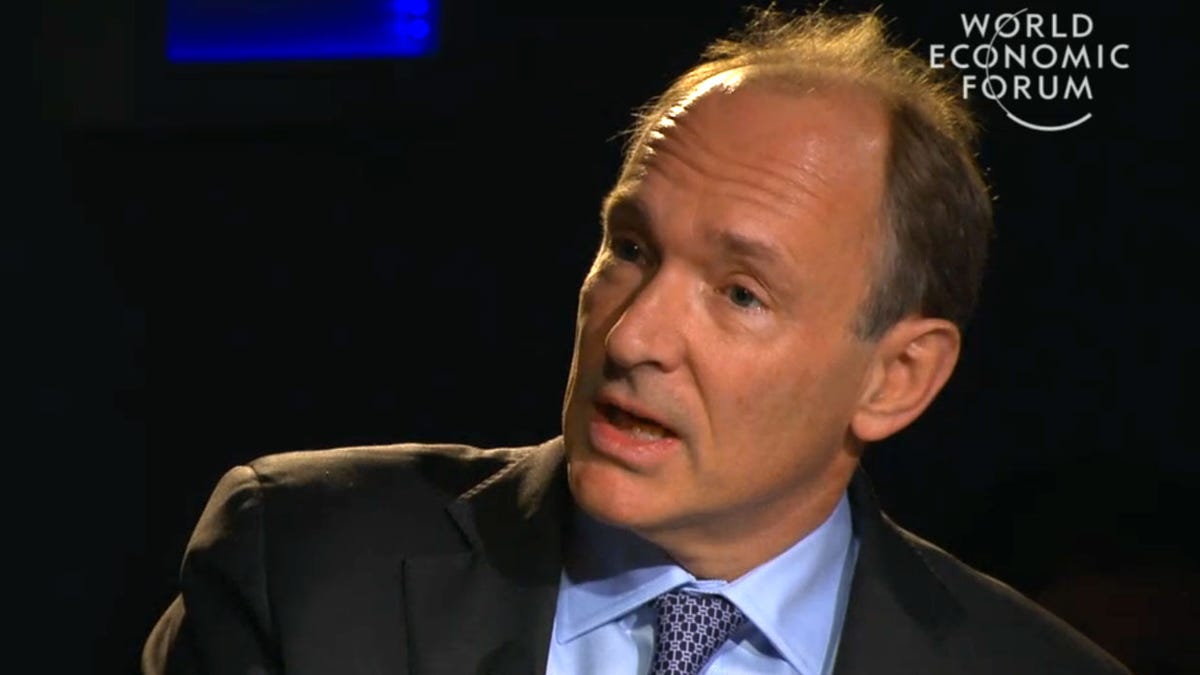Web founder Berners-Lee: Share info, improve the world
At Davos, Tim Berners-Lee urges telling people where the potholes are, letting the hospitals learn what's working, and paying musicians directly. Also: remembering Aaron Swartz.

He stopped well short of saying information wants to be free, but Tim Berners-Lee, the founder of the World Wide Web, said today the world would be better with some judicious liberation.
Speaking at the 2013 World Economic Forum today in Davos, Switzerland, Berners-Lee called on social-networking sites, academics, musicians, and governments to share more information online.
In earlier days of computing, people had full control over their own information because it was all stored on their own computer in front of them. Now, people store data with online services that deprive them of that control.
"They put their photographs into Flickr. The simplest thing in world, you'd think, would be to share these photos with Facebook friends and LindedIn colleagues. But you can't do that, because these social networks are a silo," Berners-Lee said. "There's a frustration that I've told it all my data, but I as a user don't have access to that."
Berners-Lee also called upon governments to release data -- not data about military sites or perhaps power infrastructure that could make a country vulnerable, but information like pothole locations and hospital health outcome statistics that can improve accountability, provide economic opportunities for companies, help the public, and enable organizations to learn what works or not.
"It's very difficult to measure. That's the difficulty. But you're making a common good that makes the world run more efficiently," he said. "It's a question of unlocking this potential we already have. It's a huge benefit for very little cost."
Berners-Lee also called for reforms that would let academic papers be copied freely and let music be distributed more easily with payments to musicians.
"There was a lot of push-back against the online world by the recording industry because it upset their way of selling these plastic things," he said, referring to compact discs. "We need to find a whole other new business model. We should develop a new payment protocol so when you're using things it becomes easy to pay."
Some of these ideas are recurring themes for Berners-Lee, who developed the first incarnation of the Web as a way for scientists to share information at CERN, the European nuclear physics lab and particle accelerator site on the border of Switzerland and France.
Berners-Lee has regularly voiced concerns about the future of the Web, notably government interference and walled gardens such as Facebook. He's staunchly opposed to "silos" where users no longer have control over their own information.
Remembering Aaron Swartz
And invoking the memory of Aaron Swartz, the programmer and activist who committed suicide earlier this month after facing felony charges for downloading numerous academic papers, Berners-Lee said legislators must realize that accessing that information isn't necessarily a crime.
"There seems to be a deep suspicion of anybody accessing a computer system," he said. There's a place for legislation to deal with the problems of cybersecurity, he said, but "what can happen is the legislation gets too strong." And that led to prosecutors' overreach, Berners-Lee said.
"Aaron was a hacker in the good sense. He used his programming to try to make a point," he said. "They ended up using the law [which states] if you break into a computer system anywhere then you are guilty of a felony. Never mind whether you were taking out too many library books or trying to destroy the infrastructure of a country."
Berners-Lee called Swartz "an incredibly ethical person who thought a huge amount about what was right and how the world should be." One action that brought unwelcome attention from the FBI was downloading public-domain court records from the governmental systems that charge for the service, then republishing those documents for free. The reason he did so: "To point out that the government ought to be doing that."
Swartz was exemplary because he could use his programming skills to change the world. Most computer users merely know how to use a word processor at best, but Berners-Lee called for more and better computer education.
"I'm not talking about a course to tell them what buttons to press. When you're told how to program a computer, you're taking a leap into an area, joining a group of people who do incredible things."
And looking at the very big picture, Berners-Lee said there's plenty more work to be done getting the Internet to change the world.
"World peace has not miraculously occurred. People still mainly talk to the people who have the same religion and same culture," he said. "It hasn't really broken down cultural barriers. Can we develop systems that will cause that kind of change?"

